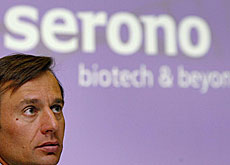
Serono shares dip as strategy changes

Biotechnology firm Serono has confounded the stock market by ditching plans to find a buyer in favour of raising funds to fuel a new "risky" expansion policy.
Monday’s announcement of the u-turn wiped more than ten per cent off Serono’s share value as the company battles to find a solution to the core problem of failing to produce new drugs.
According to the firm’s website “Serono has a strong and deep pipeline with over 25 ongoing projects in development”.
But the company’s strong performance in recent years has been largely driven by blockbuster multiple sclerosis drug Rebif, which will soon face stiff competition from a new generation of orally taken products about to hit the market.
Zurich Cantonal Bank (ZCB) analyst Yasemin Ersan is surprised that such a well-established biotech, listed on the Swiss stock exchange since 1987, has recently failed to strengthen its pipeline with the promise of more commercially big hitting drugs.
“This is not a problem that Serono are facing alone. A lot of companies that had one big product are now facing a big hole in their pipeline because they were focusing on this one product,” Ersan told swissinfo.
“With Serono it is a bit different because it is a very old company so one could expect more. But as it is the firm has a pipeline problem for whatever reason. Maybe it was just unlucky or it did not do the right things.
Logical step
“Considering this situation, either selling the company, which is obviously not the case any more, or acquiring other companies, is a logical step for Serono.”
The Geneva-based concern announced it was looking for a buyer following a strategic review in November last year.
Several big pharmaceutical firms, including Novartis and GlaxoSmithKline, were touted as potential suitors. But neither was willing to take the plunge, despite a drop in valuation from $15 billion to $11-12 billion.
News last month that Serono was looking to raise some $6 billion in capital, followed by the announcement that the company was no longer for sale, still came as a surprise.
Ersan believes the new acquisition strategy comes with a risk given a market that has become heavily inflated in recent years with a spate of big deals.
“My guess was that Serono would reduce the price further, but it has gone for a riskier strategy.
Difficult task
“There are many other biotech and pharma companies with bigger purchasing power than Serono looking to acquire smaller biotechs. It will be a difficult task to find a good target at a good price.
“The prices being paid for acquisitions and in-licensing deals have doubled in the past couple of years so it is definitely going to be an expensive option.”
Serono’s shareholders have still to vote on the new capital-raising plan at a meeting on April 25. But this is certain to be a formality given that the company’s main stakeholder, the billionaire Bertarelli family, put forward the proposal.
According to Ersan, one thing Serono does have in its favour is a healthy balance sheet with capital reserves. The ZCB analyst believes the company can afford to wait up to three years for the right deal before patent expiries and rival drugs bite into its balance sheet.
“Financially Serono has no problems and it is looking good for the next few years. The amount of money it is looking to raise should be enough to buy a smaller biotech firm, but it depends on what company it targets,” Ersan said.
“But there will be no overnight acquisitions. It could take two to three years before Serono finds the right one.”
swissinfo, Matthew Allen in Zurich
Serono is in the business of developing proteins, antibodies and small molecules to treat serious medical conditions.
It is active in the following therapeutic areas: neurology, reproductive health and growth hormones.
Its leading product is the drug Rebif, which treats multiple sclerosis; worldwide sales reached nearly $1.3 billion in 2005.
Total revenues in 2005 increased by 5.2 per cent to $2.586 billion, of which sales were $2.339 billion.
Serono was founded in 1906 in Rome by Cesare Serono and was originally called the Serono Pharmacological Institute. The company first made its mark producing fertility drugs.
In 1977 the company was moved to Geneva by then chief executive Fabio Berterelli.
Current CEO Ernesto Bertarelli took charge in 1996.

In compliance with the JTI standards
More: SWI swissinfo.ch certified by the Journalism Trust Initiative




























You can find an overview of ongoing debates with our journalists here . Please join us!
If you want to start a conversation about a topic raised in this article or want to report factual errors, email us at english@swissinfo.ch.